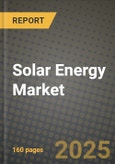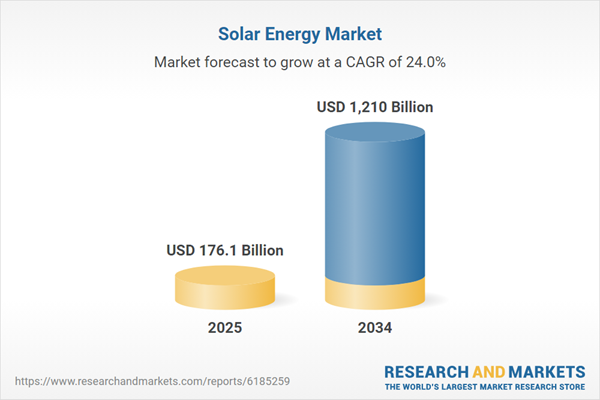The solar energy market has established itself as one of the fastest-growing sectors within the global renewable energy industry, driven by widespread concerns over climate change, escalating fossil fuel prices, and the pursuit of sustainable energy alternatives. Solar energy harnesses sunlight via photovoltaic (PV) panels or solar thermal systems to generate electricity and heat, respectively, offering substantial environmental and economic benefits. Increased government support, technological advancements, and falling equipment costs have significantly enhanced the attractiveness and accessibility of solar solutions, encouraging extensive adoption in residential, commercial, and utility-scale sectors globally. Moreover, continuous improvements in solar panel efficiency, energy storage solutions, and grid integration technologies have allowed solar power to become increasingly competitive with conventional energy sources. As countries around the world intensify efforts to achieve carbon neutrality and renewable energy targets, solar energy remains at the forefront, driving investments and shaping future global energy policies. Consequently, the solar energy market continues its robust growth trajectory, supported by strong regulatory frameworks, heightened consumer awareness, and progressive technological innovations.
The solar energy market experienced significant expansion driven by considerable investments in large-scale solar projects, ongoing technological advancements, and favorable government incentives. Global installations surged, particularly in regions such as Asia-Pacific, Europe, and North America, where ambitious renewable energy targets accelerated solar energy adoption. Innovations such as high-efficiency solar cells, particularly perovskite and tandem PV technologies, gained increased market penetration due to their higher conversion efficiencies and lower production costs compared to traditional silicon-based solar panels. Concurrently, substantial progress was made in integrating advanced energy storage systems and smart-grid technologies, enhancing solar energy reliability and reducing intermittency issues. The commercial and industrial sectors notably increased solar installations, motivated by reduced operational energy costs and improved sustainability profiles. Furthermore, 2024 saw expanded consumer participation, with growing popularity in decentralized solar systems, rooftop installations, and community solar programs that democratize energy generation, making solar power accessible and affordable to broader populations.
The solar energy market is projected to sustain its impressive growth driven by continuous innovation, heightened environmental awareness, and further cost reductions. Emerging photovoltaic technologies, including next-generation perovskite cells, quantum dot, and organic photovoltaics, are expected to significantly improve efficiency, flexibility, and affordability, fueling market expansion. Advances in large-scale battery storage and grid infrastructure will enhance solar power's integration into national energy systems, providing more stable and dependable energy sources, critical for transitioning away from fossil fuels. Additionally, increased urbanization and the implementation of stringent environmental regulations globally will drive substantial growth in both established and emerging markets. The global emphasis on electric vehicle (EV) charging infrastructure powered by solar energy is anticipated to create new growth avenues, reinforcing solar's role in sustainable transportation solutions. Thus, the solar energy market's outlook remains exceptionally positive, poised to become a dominant player in global energy production in the coming decades.
Key Insights: Solar Energy Market
- Rapid advancements in photovoltaic cell technologies, particularly perovskite and tandem cells, significantly enhancing solar efficiency, lowering costs, and accelerating their commercial adoption across global markets.
- Increasing deployment of integrated energy storage solutions alongside solar installations, substantially improving grid reliability and enabling consistent, uninterrupted renewable energy supply regardless of sunlight variability.
- Expanding popularity of decentralized solar generation, including rooftop solar systems and community solar initiatives, empowering consumers to independently produce, store, and manage energy, significantly reshaping energy consumption patterns globally.
- Accelerated integration of digital technologies such as artificial intelligence and smart grids to optimize solar energy generation, distribution, and consumption, enhancing system efficiency, reducing operational costs, and maximizing sustainability benefits.
- Emerging growth in solar-powered electric vehicle charging infrastructure, aligning renewable energy generation with transportation electrification, and promoting integrated sustainability solutions in urban and suburban environments.
- Robust governmental policies, financial incentives, and ambitious renewable energy targets globally, driving significant investment and accelerated adoption of solar energy systems across various sectors and regions.
- Rapid technological innovations continually enhancing solar panel efficiency, durability, and affordability, making solar energy increasingly competitive with conventional fossil fuel-based power sources.
- Escalating global awareness and urgency concerning climate change and environmental sustainability, motivating both public and private sectors to prioritize and increase investments in renewable energy solutions, especially solar.
- Declining costs associated with solar photovoltaic installations, driven by economies of scale, improved manufacturing processes, and widespread competition, significantly enhancing market accessibility and attractiveness to diverse consumer segments worldwide.
- Intermittency and variability in solar power generation due to weather conditions remain a significant challenge, requiring ongoing advancements in energy storage and grid management technologies to ensure consistent, reliable, and scalable energy supply and broader market acceptance.
Solar Energy Market Segmentation
By Type
- Solar Cell Panel
- Solar Cell Paste
- Solar Silicon Wafer
By Technology
- Photovoltaic Systems
- Concentrated Solar Power Systems
By Panel
- Mono-Crystalline
- Thin Film
- Poly-Crystalline
By Application
- Residential
- Commercial
By End Use
- Electricity Generation
- Lighting
- Heating
- Charging
Key Companies Analysed
- ReneSola Power Inc.
- BayWa r.e. AG
- Longi Green Energy Technology Co Ltd.
- Trina Solar Limited
- JinkoSolar Holding Co Ltd.
- JA Solar Holdings Co Ltd.
- Hanwha Q CELLS Co Ltd.
- Canadian Solar Inc.
- Sungrow Power Supply Co Ltd.
- Tata Power Solar
- China Three Gorges New Energy Group Co Ltd.
- Acciona Energia SA
- Risen Energy Co Ltd.
- Daqo New Energy Corp
- First Solar. Inc.
- Xinyi Solar Holdings Limited
- Enphase Energy. Inc.
- Sunrun Inc.
- Astronergy Solar Company Limited
- Maxeon Solar Technologies. Ltd.
- Boralex Inc.
- Shunfeng International Clean Energy Ltd.
- Bright Source Energy Inc.
- REC Silicon ASA
- Kaneka Corp
- Abengoa Solar SA
- Yingli Green Energy Holding Company Limited
- Wuxi Suntech Power Co Ltd.
- GCL System Integration Technology Co Ltd.
- CSIL Inc.
Solar Energy Market Analytics
The report employs rigorous tools, including Porter’s Five Forces, value chain mapping, and scenario-based modeling, to assess supply-demand dynamics. Cross-sector influences from parent, derived, and substitute markets are evaluated to identify risks and opportunities. Trade and pricing analytics provide an up-to-date view of international flows, including leading exporters, importers, and regional price trends.Macroeconomic indicators, policy frameworks such as carbon pricing and energy security strategies, and evolving consumer behavior are considered in forecasting scenarios. Recent deal flows, partnerships, and technology innovations are incorporated to assess their impact on future market performance.
Solar Energy Market Competitive Intelligence
The competitive landscape is mapped through proprietary frameworks, profiling leading companies with details on business models, product portfolios, financial performance, and strategic initiatives. Key developments such as mergers & acquisitions, technology collaborations, investment inflows, and regional expansions are analyzed for their competitive impact. The report also identifies emerging players and innovative startups contributing to market disruption.Regional insights highlight the most promising investment destinations, regulatory landscapes, and evolving partnerships across energy and industrial corridors.
Countries Covered
- North America - Solar Energy market data and outlook to 2034
- United States
- Canada
- Mexico
- Europe - Solar Energy market data and outlook to 2034
- Germany
- United Kingdom
- France
- Italy
- Spain
- BeNeLux
- Russia
- Sweden
- Asia-Pacific - Solar Energy market data and outlook to 2034
- China
- Japan
- India
- South Korea
- Australia
- Indonesia
- Malaysia
- Vietnam
- Middle East and Africa - Solar Energy market data and outlook to 2034
- Saudi Arabia
- South Africa
- Iran
- UAE
- Egypt
- South and Central America - Solar Energy market data and outlook to 2034
- Brazil
- Argentina
- Chile
- Peru
Research Methodology
This study combines primary inputs from industry experts across the Solar Energy value chain with secondary data from associations, government publications, trade databases, and company disclosures. Proprietary modeling techniques, including data triangulation, statistical correlation, and scenario planning, are applied to deliver reliable market sizing and forecasting.Key Questions Addressed
- What is the current and forecast market size of the Solar Energy industry at global, regional, and country levels?
- Which types, applications, and technologies present the highest growth potential?
- How are supply chains adapting to geopolitical and economic shocks?
- What role do policy frameworks, trade flows, and sustainability targets play in shaping demand?
- Who are the leading players, and how are their strategies evolving in the face of global uncertainty?
- Which regional “hotspots” and customer segments will outpace the market, and what go-to-market and partnership models best support entry and expansion?
- Where are the most investable opportunities - across technology roadmaps, sustainability-linked innovation, and M&A - and what is the best segment to invest over the next 3-5 years?
Your Key Takeaways from the Solar Energy Market Report
- Global Solar Energy market size and growth projections (CAGR), 2024-2034
- Impact of Russia-Ukraine, Israel-Palestine, and Hamas conflicts on Solar Energy trade, costs, and supply chains
- Solar Energy market size, share, and outlook across 5 regions and 27 countries, 2023-2034
- Solar Energy market size, CAGR, and market share of key products, applications, and end-user verticals, 2023-2034
- Short- and long-term Solar Energy market trends, drivers, restraints, and opportunities
- Porter’s Five Forces analysis, technological developments, and Solar Energy supply chain analysis
- Solar Energy trade analysis, Solar Energy market price analysis, and Solar Energy supply/demand dynamics
- Profiles of 5 leading companies - overview, key strategies, financials, and products
- Latest Solar Energy market news and developments
Additional Support
With the purchase of this report, you will receive:- An updated PDF report and an MS Excel data workbook containing all market tables and figures for easy analysis.
- 7-day post-sale analyst support for clarifications and in-scope supplementary data, ensuring the deliverable aligns precisely with your requirements.
- Complimentary report update to incorporate the latest available data and the impact of recent market developments.
This product will be delivered within 1-3 business days.
Table of Contents
Companies Mentioned
- ReneSola Power Inc.
- BayWa r.e. AG
- Longi Green Energy Technology Co Ltd.
- Trina Solar Limited
- JinkoSolar Holding Co Ltd.
- JA Solar Holdings Co Ltd.
- Hanwha Q CELLS Co Ltd.
- Canadian Solar Inc.
- Sungrow Power Supply Co Ltd.
- Tata Power Solar
- China Three Gorges New Energy Group Co Ltd.
- Acciona Energia SA
- Risen Energy Co Ltd.
- Daqo New Energy Corp
- First Solar. Inc.
- Xinyi Solar Holdings Limited
- Enphase Energy. Inc.
- Sunrun Inc.
- Astronergy Solar Company Limited
- Maxeon Solar Technologies. Ltd.
- Boralex Inc.
- Shunfeng International Clean Energy Ltd.
- Bright Source Energy Inc.
- REC Silicon ASA
- Kaneka Corp
- Abengoa Solar SA
- Yingli Green Energy Holding Company Limited
- Wuxi Suntech Power Co Ltd.
- GCL System Integration Technology Co Ltd.
- CSIL Inc.
Table Information
| Report Attribute | Details |
|---|---|
| No. of Pages | 160 |
| Published | October 2025 |
| Forecast Period | 2025 - 2034 |
| Estimated Market Value ( USD | $ 176.1 Billion |
| Forecasted Market Value ( USD | $ 1210 Billion |
| Compound Annual Growth Rate | 23.9% |
| Regions Covered | Global |
| No. of Companies Mentioned | 30 |









